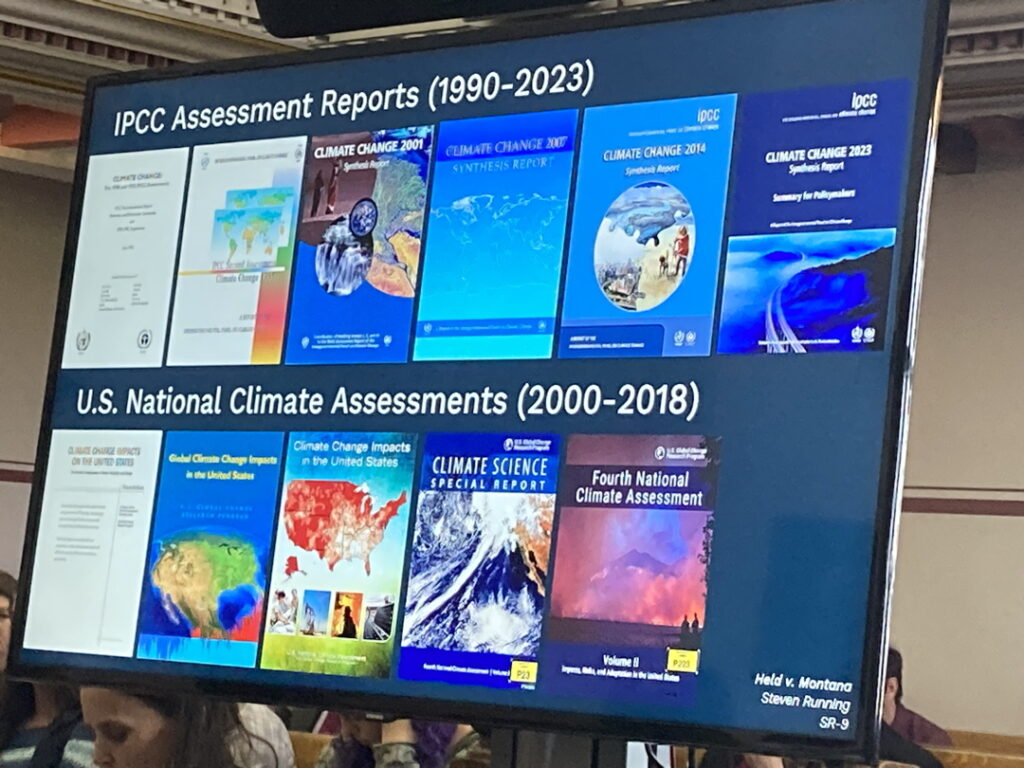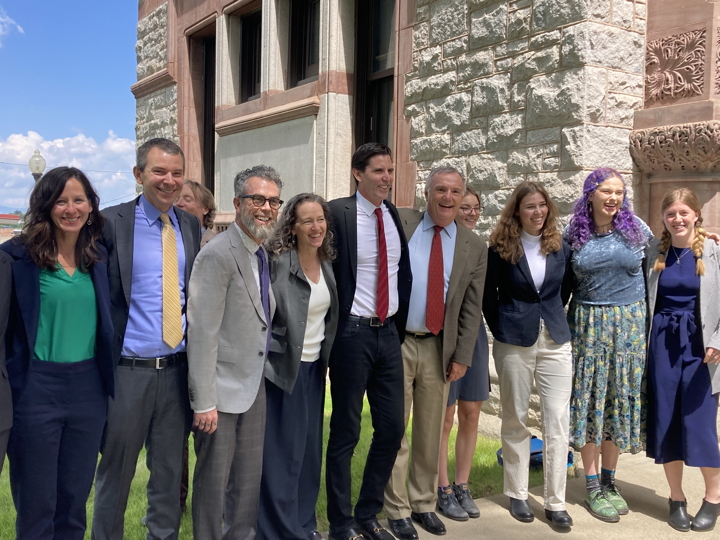Attorneys representing a group of young people suing the United States government in a groundbreaking constitutional climate lawsuit are pressing a federal district court in Oregon to deny the Department of Justice’s attempts to quash the case before trial, citing the recent ruling out of Montana in favor of youth plaintiffs as a “persuasive” example of the importance of letting youth voices and climate science be heard at trial.
In a filing with the U.S. District Court for the District of Oregon on Monday, attorneys with Our Children’s Trust – the Oregon-based nonprofit law firm spearheading youth-led constitutional climate litigation in the U.S. – pointed to last week’s historic decision in Held v. State of Montana as supportive of their request that District Judge Ann Aiken “set an immediate trial date” for their case against the federal government. That case, Juliana v. United States, seeks to hold the U.S. government accountable for perpetuating a fossil fuel-based energy system and worsening the climate crisis.
First filed in 2015, Juliana is currently awaiting a ruling in the district court on the U.S. Department of Justice’s latest request to terminate the case.
“The Held Order flies in the face of the arguments of the U.S. Department of Justice (“DOJ”) that a trial in Juliana is a waste of judicial economy,” the attorneys write in their filing, called a Notice of Supplemental Authority. It argues the Montana case shows “youths’ climate injuries from fossil fuel policies and practices are provable at a manageable trial” and that courts can provide relief in the form of declaring government policies and conduct to be unconstitutional.
In a first-of-its-kind decision issued August 14, Judge Kathy Seeley in the First Judicial District Court of Montana ruled in favor of 16 young Montanans who put their state government on trial in June in what was the first constitutional climate trial in U.S. history. Judge Seeley found that the state had violated youth plaintiffs’ fundamental rights under the Montana constitution by enacting policies promoting fossil fuels and prohibiting consideration of climate change in fossil fuel permitting decisions, thereby contributing to dangerous climate change and environmental degradation.
The ruling cited testimony presented at trial including youth plaintiffs’ personal accounts of how climate change impairs their health and quality of life, backed by experts explaining the science underlying these harms and linking it to government policies.
“It’s the first decision that’s really tied tightly to the best available science on how we protect our climate system for young people,” Julia Olson, Our Children’s Trust executive director and chief legal counsel, said of Judge Seeley’s ruling during a Facebook webinar on Monday.
“Hearing the expert witnesses and backing up everything we were saying with peer-reviewed scientific evidence, it was all just a really wonderful experience,” added 17-year-old plaintiff Eva Lighthiser of Livingston, Montana.
In their Monday filing with the Oregon district court, Olson and co-counsels Phil Gregory and Andrea Rodgers explained that the ruling in the Montana case “recognized the relevance and suitability of climate science to judicial decision-making.”
Judge Seeley not only recognized the “overwhelming scientific consensus” that the extraction and burning of fossil fuels are resulting in dangerous climate impacts, but that “every ton of fossil fuel emissions” only worsens these impacts. She even quoted the stark warning from the Intergovernmental Panel on Climate Change in its latest scientific assessment: “Climate change is a threat to human well-being and planetary health (very high confidence). There is a rapidly closing window of opportunity to secure a livable and sustainable future for all (very high confidence).”
IPCC Report ‘Incredibly Important’
As Delta Merner, lead scientist at the Science Hub for Climate Litigation at the Union of Concerned Scientists, told DeSmog, the court’s recognition of the scientific consensus from the IPCC shows that climate science is relevant to court decisions.
“It’s an incredibly important document to be using,” she said of the IPCC reports. “You can’t have junk science that is coming into these courtrooms.”
During its defense, the state of Montana did not even try to dispute or discuss climate science; the state declined to call two of their three expert witnesses including climatologist-turned-climate-contrarian Judith Curry.
“The state failed to put on any case at all,” said Patrick Parenteau, emeritus professor of law at Vermont Law and Graduate School.
Similarly, the U.S. government may have a hard time defending their continued authorization of fossil fuel development when faced with evidence of climate science in a court of law.
“The science is very clear,” Merner said. “Right now what we know scientifically is that reduction [of fossil fuels] is the primary way to reduce emissions.”
The IPCC’s latest report says that climate mitigation calls for a “substantial reduction in overall fossil fuel use.”

And yet the U.S. government continues to permit substantial oil and gas production and to support new fossil fuel infrastructure and extraction projects like the massive ConocoPhillips Willow drilling project in Alaska.
As the Juliana youth plaintiffs’ attorneys note in their filing with the Oregon district court, “thanks to the policies and practices of the last three administrations, Obama, Trump, and now Biden, the United States is today the largest producer of oil and gas in the world.”
These federal policies and practices promoting fossil fuels, the Juliana case argues, contribute substantially to the climate crisis that is already harming young people, violating their constitutional rights such as rights to life, liberty and property. The case had twice been scheduled for trial but persistent government opposition ultimately derailed trial proceedings before a federal appeals court eventually dismissed the case in January 2020.
But in June, Judge Aiken reactivated the case after attorneys for the youth plaintiffs revised their complaint and narrowed their requested relief, which set the case back on track towards trial. Eight years after the case was filed, Department of Justice lawyers are once again fighting to stop it from getting to trial.
But the devastating impacts of the climate crisis – from horrific wildfires to disastrous floods and deadly heat – are only becoming more intense and the climate science demanding urgent action is becoming more irrefutable, Merner said.
“As there continues to be delay tactics through various dismissal attempts or appeal processes, as time goes by, the reality of climate change is worsening,” she said. And the science and our understanding of it is getting stronger.”
Subscribe to our newsletter
Stay up to date with DeSmog news and alerts







